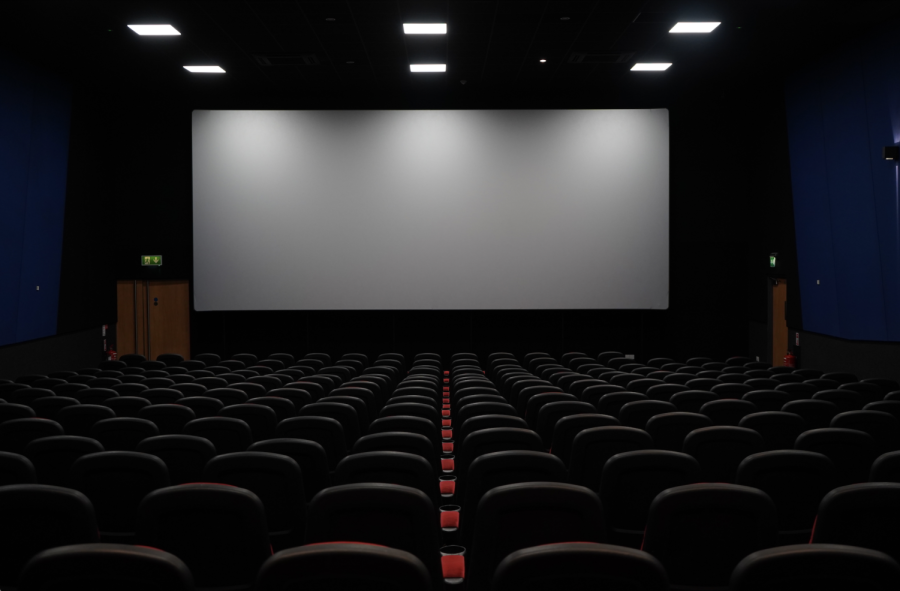Film Review: Florence Pugh Saves ‘Don’t Worry Darling’
Trigger Warning: The article contains mentions of domestic violence and sexual assault.
The Sep. 23 premiere of Olivia Wilde’s film, “Don’t Worry Darling,” turned heads not only as a project to follow Wilde’s acclaimed 2019 release “Booksmart,” but as one that featured a hotly followed cast in Hollywood. Harry Styles, Florence Pugh and Nick Kroll were only a few of the eye-catching names in the lineup, followed by Chris Pine and Gemma Chan. The movie itself, which I had the opportunity to view at the Hamilton Movie Theater, fell short of what I, and what I assume other fans, had initially expected of the project. Though it presented itself with fashionable cinematography and a few high notes, it lacked coherence and often faltered from seriousness, in a seemingly unintentional sense. It was the first time I had viewed a film in an empty theater.
The premiere of Wilde’s film was preceded by a deeply dramatic line of casting controversy that divided the cast and crew. Though the cast ultimately welcomed musician Harry Styles to their lineup, his leading role was initially allocated to Shia LeBeouf. In a series of murky clarifications provided by both LeBeouf and Wilde, LeBeouf claims that he left the film because he was not given enough time to rehearse, according to Variety. The history, however, tells a deeper, darker story. At the time of the film’s early development stages, musician FKA Twigs (who was LeBeouf’s ex-partner at the time) came forward with a series of disturbing allegations concerning LeBeouf’s character. She accused him of violent abuses and animal cruelty, among other criminal accusations, to which he responded with a confession on actor Jon Bernthal’s podcast “Real Ones.”
“I hurt that woman,” said LeBeouf. “[I] hurt a lot of people, and I’m fully aware of that. And I’m going to owe for the rest of my life.”
Wilde has been criticized for her response to LeBeouf’s exit from the film after a video surfaced in which she urges LeBeouf to stay with her cast and work things out with co-star Florence Pugh.
“I think this might be a bit of a wake-up call for Miss Flo, and I want to know if you’re open to giving this a shot, with me, with us,” said Wilde. “If she really commits — if she really puts her mind and heart into it at this point, and if you guys can make peace, what do you think?”
This response, following the public lawsuit that LeBeouf lost, appears to many as a stain on Wilde’s character. Pugh’s intimate scenes with her co-star, which involve a marital relationship and sexual intercourse, were clearly unfit for LeBeouf’s actions outside of filming. Thus, with Pugh in the lead role, Wilde and Pugh’s relations became very complicated, as Wilde begged an abuser to play what the film portrays as a typical, utopian husband in a simulated husband-housewife dynamic characteristic of the 1960s. The final cuts of the intimate scenes themselves, as they were released, were questionably coordinated, with many lacking an expression of the character’s consent written into the script.
Wilde and Pugh’s imbalanced power dynamic seems present in the final cuts of the film. Wilde acts in the film as the character “Bunny,” a housewife brought into a virtual simulation platform where modern-day male partners trap their romantic interests (who are all portrayed as women) in a man-and-wife imagined utopia reflective of the misogynistic dilemma of the 1960s. Bunny, who lives with the awareness that her reality is virtual, differs from Pugh’s character, Alice, who does not realize that she has been trapped in the simulation. Bunny often argues with Alice to maintain virtual order, which makes it difficult for viewers to imagine that both actresses’ assertions aren’t infused with a personal muse.
Pugh’s devoted and professional performance is thus impressive considering the treatment she received behind the scenes. For an actress with a slew of awards for Hollywood’s acclaimed “Midsommar” and “Little Women” movies, her acting reflects her consistency. In argumentative scenes with her husband, Jack, Alice delivers her lines with striking fervor. Musician Harry Styles’ delivery, who portrays Jack, pales in comparison to Pugh’s hand-shaking yells. Following the release of “Don’t Worry Darling,” Styles has received criticism for his acting, which many have referred to as subpar; among other criticisms, this performance is reflected in the film’s Rotten Tomatoes score of 38%. Though many found themselves rooting for Styles’ deliverance, many of his appearances lacked emotional rawness, to the extent that his acting left audiences unfulfilled.
Considering the film’s various shortcomings, it succeeded elsewhere in its stunning color palettes and admirable wardrobe choices. The latter attribute can be primarily credited to the choices of Arianne Phillips, who worked on the wardrobe for other films such as “Once Upon a Time in Hollywood.” Dangling earrings and bright, floral dresses are characteristic of “Don’t Worry Darling,” where the husbands are portrayed with slicked hair and neat suits. Wilde’s vibrant pops of kitschy red and green tones transport the viewer back to the 60s. A hypnotic sequence is repeated as the viewers and characters exit and enter the simulation scenes, where a circle of dancers creates the illusion of a dilating pupil in a cult-like initiation into the virtual ether. The dance scenes are coordinated to creep out the audience, and they work — so prepare to get jump-scared in tandem with the score’s gasping music pieces.
The problematic process of hiring unsound actors that took place behind the scenes created a film lacking solid performances. Olivia Wilde’s “Don’t Worry Darling” largely failed, but Florence Pugh presented herself with the grace consistent in her other endeavors, and for that, she deserves recognition.







